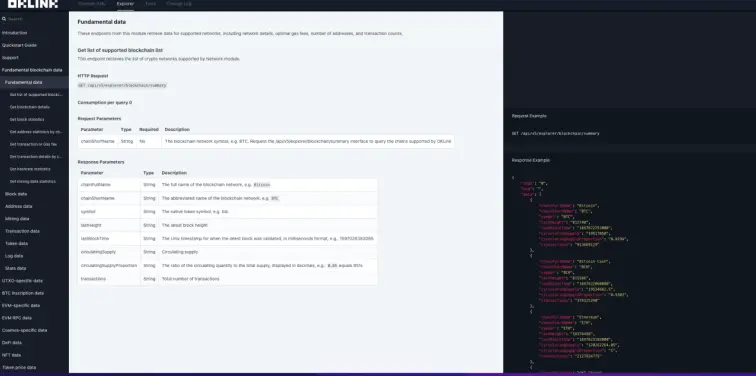OKG Research: The widespread adoption of AI and Web3 relies on this "invisible" technology
Over 40 years ago, in the early development of computer science, the first APIs (Application Programming Interfaces) emerged to enable data sharing and exchange between different applications. With the proliferation of the internet and cloud computing, APIs have gradually become ubiquitous.
Today, in the Web3 space, as most projects and organizations begin to focus on data and application innovation, APIs are becoming increasingly important. During a conversation with Victor, the product manager of OKLink at OKEx, he stated, "Whether it's a blockchain explorer or an on-chain data service provider, APIs are indispensable."
1. Why are APIs "indispensable"?
More and more people are trying to integrate AI products like ChatGPT into their daily work routines for brainstorming, summarizing text, retrieving translations, or drafting emails. All of these rely on APIs: like an "amplifier for AI technology," APIs allow complex AI technologies to be quickly integrated into applications by more developers and organizations, making it easier for users to utilize AI, thereby driving widespread adoption and explosive growth of the technology.
From this perspective, many of the AI applications we see today are actually recreations based on APIs. After all, not all organizations have the capability to start research from scratch, but with APIs, everyone has the opportunity to participate in the exploration and practice of more AI applications.
Domestic and international giants such as OpenAI, Microsoft, Google, Amazon, and Baidu have now opened up a wealth of artificial intelligence API interfaces and are engaged in fierce competition around APIs. Because behind APIs lies the ecosystem: whoever's API can be chosen and used by more organizations and developers will have a greater advantage in future competition.
In the Web3 world, APIs cannot be overlooked, especially in the field of Web3 data. Although on-chain data is theoretically open and transparent and accessible to everyone, it is often difficult to obtain directly. This is especially true when applications like wallets or NFTs require data from multiple blockchain networks, as the data structures and output formats can vary, and they must meet different API interface specifications for repeated data calls, resulting in a massive and complex workload.
However, for most DApp and crypto application developers, calling on-chain data extensively is essential when building product frontends and providing services. From setting up nodes to data filtering and successfully obtaining the required data, each step requires a significant amount of time. If there are useful APIs that can solve these problems, it will undoubtedly free users and developers from the vast amounts of on-chain data and address many data challenges faced by enterprises and brands entering the Web3 market. APIs can be seen as enabling technologies hidden beneath the surface of blockchain, truly driving the construction of the Web3 ecosystem.
Today, many organizations providing blockchain data API services are emerging in the Web3 market, primarily consisting of blockchain explorers and on-chain data service providers. Taking OKLink's OpenAPI as an example, it currently supports block data from over 40 mainstream public chains and provides token price data from over 200 blockchain networks, covering more than 7 million tokens and NFTs, as well as comprehensive data on popular protocols including runes, BRC20, and ARC20. "More importantly, we adopt an integrated API interface design. Users only need to use one API to obtain all data from over 40 chains in one stop," Victor said.

2. What is the use of data APIs in the Web3 field?
After obtaining on-chain data through APIs, what can we actually do with it? Many people are unclear. In fact, this data is playing a role in numerous public chains, wallets, DApps, and security-related Web3 projects and platforms.
Recently, the Meme narrative has become popular, and Sui, as the hottest L1 public chain, is also attracting widespread attention. If a wallet wants to integrate Sui into its product and support data queries and retrieval for popular Meme coins, what should it do?
The most direct way is, of course, to build a node to obtain Sui chain data, but this incurs costs related to self-built nodes, block synchronization, data storage, and maintenance. In contrast, leveraging the API services provided by OKLink is a lighter and more efficient choice. Developers can quickly obtain data across multiple dimensions such as transactions, addresses, and tokens through simple API calls, and can track and visualize transaction data for specific wallet addresses to meet user market demands.
Media or on-chain analysts can also obtain data through APIs and analyze specific data dimensions based on their needs, thereby gaining more accurate and reliable on-chain information for their professional work and investment decisions. Various Web3 markets and platforms can utilize blockchain data APIs to obtain and update on-chain data in real-time, and visualize it on the platform frontend. Therefore, although we may not always directly perceive the existence of on-chain data APIs, we have, to some extent, used or come into contact with related products and services.
In the future, more and more brands and enterprises will attempt to build Web3 applications or platforms, whether starting from scratch or upgrading existing technologies. Using blockchain data APIs will make these tasks simpler. And APIs will accompany the development and maturation of these applications, making on-chain data ubiquitous in the Web3 world.








